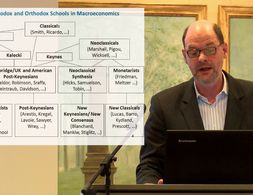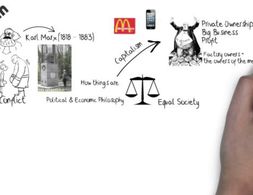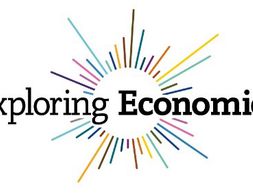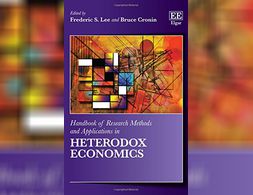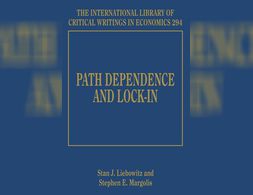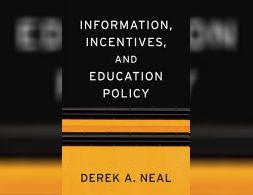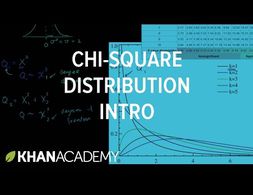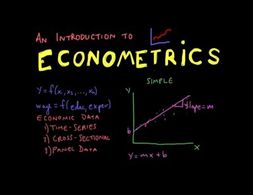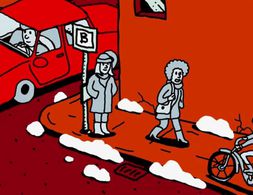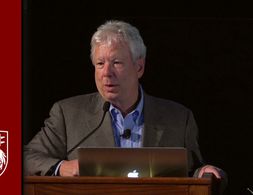✕
882 results
When Santa Fe Institute Scientists first started working on economics more than thirty years ago, many of their insights, approaches, and tools were considered beyond heterodox. These once-disparaged approaches included network economics, agents of limited rationality, and institutional evolution—all topics that are now increasingly considered mainstream.
The book provides an excellent comparative perspective on New Keynesian "New Consensus" economics and Post-Keynesian Economics at a beginner level. It also offers an interactive tool to understand how the economic models work, especially from a heterodox / pluralist perspective.
Game theory is the standard quantitative tool for analyzing the interactions of multiple decision makers. Its applications extend to economics, biology, engineering and even cyber security.
The first book to bring together the key writings and speeches of civil rights activist Sadie Tanner Mossell Alexander--the first Black American economist In 1921, Sadie Tanner Mossell Alexander became the first Black American to gain a Ph.D. degree in economics. Unable to find employment as an economist because of discrimination, Alexander became a lawyer so that she could press for equal rights for African Americans.
This lecture by Prof. Dr. Eckhard Hein is part of the Introductory Lectures on Heterodox Economics at the 20th FMM Conference in 2016. It gives a good overview about where Post-Keynesian Economics can be located and what it is all about.
This lecture is all about the challenge to include heterodox approaches into macroeconomics. After giving an overview of recent approaches to that problem Professor Michael Roos presents the theoretical framework of Complexity Economics as a means to combine behavioral aspects with macroeconomics.
This presentation looks at the basic idea of Marxism, specifically the conflict between the different classes in society.
An analysis of the modern neoliberal world, its characteristics, flaws and planetary boundaries aiming to end new economic politics and support a global redistribution of power, wealth and roles.
In this online lecture, economist and Professor at the School of Oriental and African Studies (SOAS), London, UK. Costas Lapavitsas, explains the limitations of the neoliberal market in creating financial stability and growth in both, developing and developed countries.
Exploring Economics, an open-source e-learning platform, giving you the opportunity to discover & study a variety of economic theories, topics, and methods.
New challenges require new approaches. Is economics part of the problem or part of the solution? Probably both.
Exploring Economics, an open-access e-learning platform, giving you the opportunity to discover & study a variety of economic theories, topics, and methods.
How did the industrialized nations of North America and Europe come to be seen as the appropriate models for post-World War II societies in Asia, Africa, and Latin America? How did the postwar discourse on development actually create the so-called Third World? And what will happen when development ideology collapses? To answer these questions, Arturo Escobar shows how development policies became mechanisms of control that were just as pervasive and effective as their colonial counterparts.
The Elgar Companion to Neo-Schumpeterian Economics surveys the achievements of the most visible scholars in this area. The contributions to the Companion give both a brief survey on the various fields of neo-Schumpeterian economics as well as insights into recent research at the scientific frontiers.
Despite the important methodological critiques of the mainstream offered by heterodox economics, the dominant research method taught in heterodox programmes remains econometrics.
The economics of worker cooperatives is a branch of economic inquiry with a long and esteemed pedigree, dating at least from the work of John Stuart Mill in the mid-nineteenth century.
Since their first emergence in the work of Paul David thirty years ago, the dual issues of Path Dependence and Lock-In have become critically important subjects in the fields of economics, sociology, and business strategy.
Within the heterodox field one of the most active topics is related to the theory of economic growth and distribution This is a textbook for advance undergraduate and graduate students Throughout its 18 chapters Classical Neoclassical and post Keynesian models are developed Each chapter contains study problems and suggested readings …
Derek Neal writes that economists must analyze public education policy in the same way they analyze other procurement problems. He shows how standard tools from economics research speak directly to issues in education. For mastering the models and tools that economists of education should use in their work, there is no better resource available.--
In this course you'll learn about the tools used by scientists to understand complex systems. The topics you'll learn about include dynamics, chaos, fractals, information theory, self-organization, agent-based modeling, and networks.
The definition of a chi-square distribution is given. Chi-square is defined as the sum of random normally distributed variables (mean=0, variance=s.d.=1). The number of added squared variables is equal to the degrees of freedom. With more degrees of freedom the probability of larger chi-square values is increased.
First some definitions regarding econometrics, regressions, types of data and independent and dependent variables are given. Then the basic function of a simple regression analysis is explained. Lastly, there is discussion of the meaning of the error term.
Snow removal, ambulance transport, and school performance -the film aims at illustrating the principles of gender mainstreaming through concrete examples.
The podcast explores the psychosocial implications of poverty in the society. Keetie Roelen investigates how the emotion of shame and policy-making are intertwined.
UBC's Henry Siu, a professor at the Vancouver School of Economics, speaks about innovation in economics, technological progress and what it means for the fut...
This content submission has two parts: (1) a link to the post by Wolf Richter on deterioration of US subprime credit card debt and loans, driven in part by the overuse of hedonic quality adjustments in the Consumer Price Index (CPI) used by the US Bureau of Labor Statistics, and (2) to introduce Exploring Economics to the website Naked Capitalism, which is an effort to promote critical thinking through the medium of a finance and economics blog and fearless commentary.
An overview of the last century economic theories asking what makes a heterodox economist. This lecture focuses on the evolution of the various academic traditions in economics. Lavoie presents his own typology for categorising seminal work within the post-Keynesian tradition while leaving space to acknowledge that categories are not binary, but can be used to help understand the different traditions, and how they have developed over the last decades.
This video explains what the term 'Feminist Economics' describes and goes into detail on how feminist economists use methodology differently, why they advocate for diversity in research and how to look into preconditions for the functioning of our economies. It, additionally, highlights the link between feminist economics and the study of climate change.
Podcast series with six 12-minute parts introducing the the values and ideas behind our neoliberal economic system: where it came from, how it spread, and how we could do things differently.
Richard Thaler gives a lecture in the 2018 Nora and Edward Ryerson Lecture at the University of Chicago. In the lecture he discusses his Nobel Prize winning research.
Karl Marx was the greatest champion of the labor theory of value. The logical problems of this theory have, however, split scholars of Marx into two factions: those who regard it as an indivisible component of Marxism, and those who wish to continue the spirit of analysis begun by Marx without the labor theory of value.
The Nobel laureate Amartya Sen´s text analyzes three main figures in social sciences and the relation between them: the Italian economist Piero Sraffa, the Austrian philosopher Ludwig Wittgenstein, and the Italian politician and philosopher Antonio Gramsci.
This lecture course, which will be taught in English, will deal with gender issues in developing countries. After providing an overview of the gender differences in various aspects of welfare and economic life, the course will then tackle a number of specific issues.
We use cookies on our website. Click on Accept to help us to make Exploring Economics constantly better!





